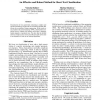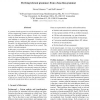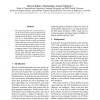29 search results - page 4 / 6 » When is Self-Training Effective for Parsing |
NAACL
2003
13 years 10 months ago
2003
This paper investigates adapting a lexicalized probabilistic context-free grammar (PCFG) to a novel domain, using maximum a posteriori (MAP) estimation. The MAP framework is gener...
AAAI
2008
13 years 11 months ago
2008
Classification of texts potentially containing a complex and specific terminology requires the use of learning methods that do not rely on extensive feature engineering. In this w...
BMCBI
2006
13 years 9 months ago
2006
Background: We study the adaptation of Link Grammar Parser to the biomedical sublanguage with a focus on domain terms not found in a general parser lexicon. Using two biomedical c...
ICSM
2003
IEEE
14 years 2 months ago
2003
IEEE
A grammar-based approach to tool development in re- and reverse engineering promises precise structure awareness, but it is problematic in two respects. Firstly, it is a considera...
ACL
2008
13 years 10 months ago
2008
This paper describes how external resources can be used to improve parser performance for heavily lexicalised grammars, looking at both robustness and efficiency. In terms of robu...



